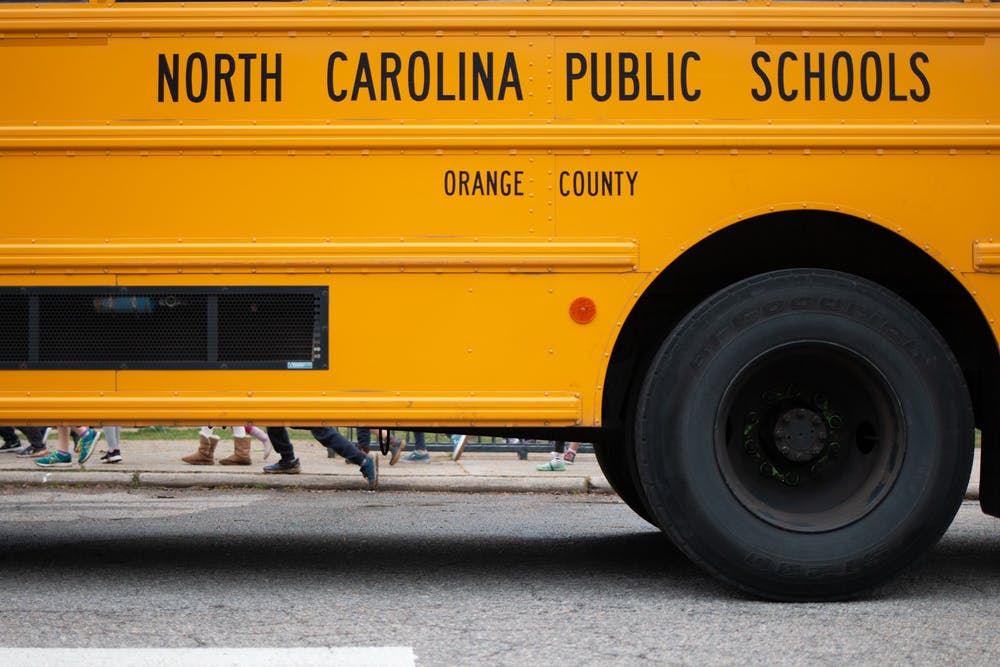HILLSBOROUGH – While our nation’s senators debate one of the first major education bills in a decade, one local education board member is speaking up.
“At this point, I would prefer to have a little bit more federal involvement because of the direction our state is going in right now,” Sanders says. “With some of the things they’ve passed, they’re hurting public education.”
That’s Orange County Board of Education member, Lawrence Sanders, a member of Orange County’s Board of Education, who says he opposes the Student Success Act (SSA) because of the state of education in North Carolina.
The SSA, passed by the U.S. House last week, would undo many of the federal guidelines for schools set out in a 2002 law, No Child Left Behind. These guidelines include how to evaluate schools, how to spend federal money on certain aspects of schools, and how to handle a failing school.
With guidelines for how to evaluate schools going back to states, Sanders says he’s is not optimistic about how the new process would go.
“I’m just not sure how that’s going to be handled when you look at the state of North Carolina,” Sanders says. “Right now, there’s not a lot of support being shown to teachers.”
On top of that, Sanders says the SSA does not help states move away from using testing as the main assessment metric.
“It continues to have the emphasis on the testing. What that does is have teachers focus a lot more on testing than they should,” Sanders says.
In addition, the SSA keeps federal education spending at the sequester rates, which Sanders says would lead to a cut of about $1 billion nationally.
“To some degree, it’s going to translate down to some dollars being lost for OrangeCounty schools as well,” Sanders says.
Sanders calls the SSA part of a nationwide effort to dismantle public education.
“It’s all, to me, an effort to continue to promote charter schools, especially those run by for-profit organizations,” Sanders says. “As well as the voucher program, which I refuse to believe will help poor or disabled or non-English speaking students.”
The bill, divided along party lines in the House, is now heading to the Senate, where the Democratic majority has its own education bill.
Related Stories
‹

In Chapel Hill, NC School Superintendent Mo Green Offers a Plan for 'Achieving Educational Excellence'Mo Green's "Achieving Educational Excellence" plan seeks to make North Carolina schools the best in the nation by 2030.

On the Porch: Sen. Natalie Murdock - Good Work for NC District 20This Week:
NC Sen. Natalie Murdock is a native North Carolinian, UNC alum, and senate representative for District 20, which encompasses Durham and Chatham County. She served as Deputy Communications Director for NC Attorney General Josh Stein. She is the first woman of color under 40 to be elected to the NCGA and was elected in 2020 with over 100,000 votes. As a freshman senator she immediately filed over 100 bills that range from supporting black maternal health, expanding healthcare access for ALL to providing greater access to the ballot.

'Everything We Do Has Meaning': Lloyd Kramer Reflects on a Career in the HumanitiesOutgoing Carolina Public Humanities director Lloyd Kramer reflects on his career, and the social importance of history and the humanities.

'We Are 49th Out Of 50': Public School Forum of NCWith education at the center of state budget talks, the Public School Forum of NC releases a report on the state of North Carolina's schools.
![]()
What to Expect (and Not Expect) in the General Assembly Short SessionImmigration, education, marijuana, childcare, open records: which bills will pass the General Assembly this year? Sen. Graig Meyer weighs in.

DeSantis Is Defending New Slavery Teachings. Civil Rights Leaders See a Pattern of ‘Policy Violence’Written by STEVE PEOPLES, BRENDAN FARRINGTON AND KAT STAFFORD Civil rights activists cheered when Ron DeSantis pardoned four Black men wrongfully convicted of rape as one of his first actions as Florida’s governor. But four years later, as DeSantis eyes the presidency, their hope that the Republican would be an ally on racial justice has long faded. Instead, […]

North Carolina House Unlikely To Proceed With Education Overhaul, Speaker SaysWritten by HANNAH SCHOENBAUM A sweeping education proposal that would take away power from North Carolina superintendents and the State Board of Education, placing it in the hands of public school parents, is unlikely to advance this session, the House speaker said Thursday. The 26-page bill, introduced last week but pulled from a committee agenda, would […]

CHCCS Elementary Schools' Early Start Time Will Not Move ForwardFacing a bus driver shortage, the Chapel Hill-Carrboro City Schools Board of Education recently brainstormed solutions to get students to school on time. One possibility was moving elementary school start times forward. But some parents were opposed to this change, and the school board decided against it.

'How Are We Engaging in Schools?' Orange County Shares Survey ResultsIn its first meeting of the year, the Orange County Schools Board of Education discussed results from a survey that aimed to better understand issues facing parents and students.

Chapel Hill High School Choir Performs at Radio City, Carnegie HallLast month, choir students at Chapel Hill High School made a trip to New York to perform at Radio City Music Hall and Carnegie Hall — along with the Rockettes and Eric Whitacre.
›










